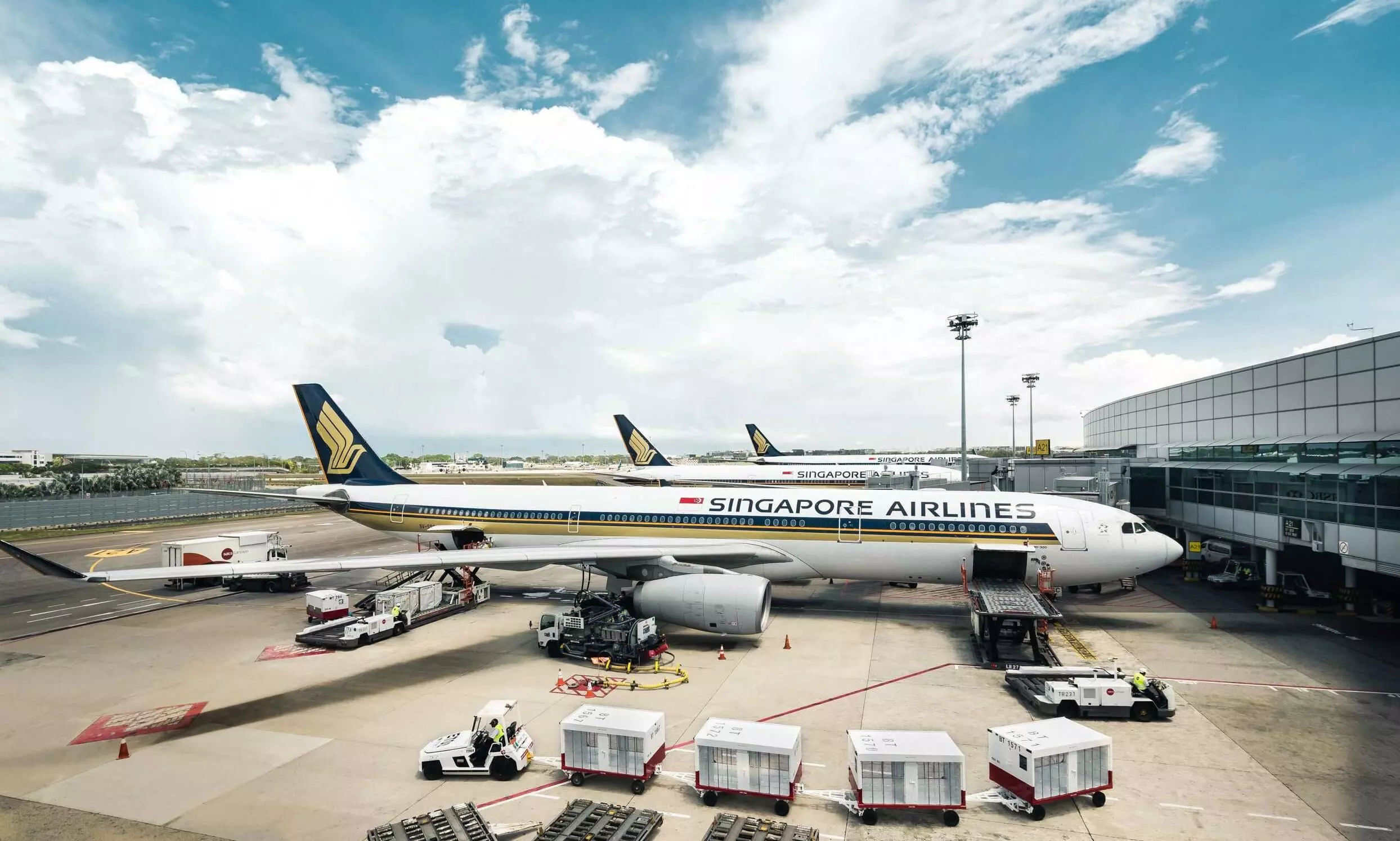
Singapore: Southeast Asia’s cargo gem

Photo: SATS Ltd.
Positioned at the heart of the dynamic and vibrant region of Southeast Asia, Singapore is not only the freight hub for Asia but for the world. But that's not the end of this story. Its focus on infrastructure and partnerships is preparing it to be the air freight hub of the future as well.
It is the smallest country in Southeast Asia but ranks top in per capita GDP. It is one of the few countries in the world with almost no natural resources but has a significant amount of world trade that passes through. It is not only home to one of the busiest seaports in the world but also an airport ranked amongst the top 10 cargo airports in the world. Singapore is Southeast Asia’s cargo gem. Singapore even topped the World Bank’s 2023 Logistics Performance Index (LPI) on trade logistics performance.
In March 2022, DHL Express and Singapore Airlines (SIA) signed a crew and maintenance agreement to deploy five Boeing 777 freighters under which SIA operates new cargo routes between South Asia, North Asia and North America, based at Changi Airport in Singapore. This is one of the latest examples of how the world and world’s best cargo movers leverage the position of Singapore as the global cargo hub to move their goods.
But why? With a suitable geographic position, Singapore’s Changi Airport offers robust air connectivity to different parts of the world. It also offers strong infrastructure and service quality with its air cargo partners. In 2022, Changi Airport was ranked 10th globally based on international cargo traffic and was the busiest air cargo hub in Southeast Asia. According to the latest operational figures, Changi Airport registered an airfreight throughput of 1.3 million tonnes for the first nine months of 2023.
The quarterly operations data reads, “From July to September 2023, airfreight throughput totalled 451,000 tonnes, a decline of 4 percent compared to the same period last year. The softening in air cargo demand has gradually eased during the quarter, led by improvements in transhipment volumes. For the period, Changi’s top five air cargo markets comprised Australia, China, Hong Kong, India and the United States of America. Notably, air cargo traffic with India registered a strong growth of 21 percent compared to the corresponding period last year.”

“One of Changi Airport’s strengths as a leading air cargo hub lies in our robust network and connectivity, supported by a vibrant community of air cargo partners.”
Lim Ching Kiat, Changi Airport Group
Lim Ching Kiat, executive vice president of air hub & cargo development, Changi Airport Group points out that the airport has one of the widest networks in Asia Pacific, served by dedicated freighters and belly hold capacity.
“One of Changi Airport’s strengths as a leading air cargo hub lies in our robust network and connectivity, supported by a vibrant community of air cargo partners. Changi Airport is currently connected to some 360 cities globally, with close to 100 airlines including some 30 freighter operators that operate over 530 weekly flights,” he said.
Southeast Asia in particular, with its burgeoning growth in manufacturing, trade, and logistics, is a prime area of focus for Changi Airport.
“Positioned at the heart of this dynamic region, Changi Airport is committed to expanding our cargo network and reinforcing our regional presence. We are also focusing our attention on the areas of enhancing cargo handling capabilities, sustainability, automation and digitalisation over the near- to medium-term,” he added.
Supported by 70 hectares of contiguous Airport Free Trade Zone and key cargo facilities, Changi Airport can handle up to 3 million tonnes of air cargo annually. With fast-growing regional trades, Changi is investing in the Changi East development to almost double its handling capacity to 5.4 million tonnes per annum in its end-state.
According to Lim, the future expanded air cargo hub will be smarter, more connected, and more efficient.
“As a global air cargo hub, strengthening service quality, and delivering reliability are Changi's key thrusts. To this end, Changi's strategies and priorities are centred on fostering network and connectivity, improving operational efficiency, and boosting handling capabilities through partnerships and community stewardship,” he informed.

"While cargo connectivity remains critical, the airport also prioritises raising service quality for long-term sustainable cargo growth by leveraging automation and digitalisation.”
Sam Gould, dnata Singapore
While infrastructure is one part of the coin, the airport needs to foster strong collaborations and reliable partners to maintain its status as a global air cargo hub.
Designed to handle an annual turnover of 550,000 tonnes, the ground handler dnata’s cargo terminal at Changi Airport facilitates the movement of cargo, including perishables, pharmaceuticals, dangerous goods, live animals, aircraft engines and vehicles.
Sam Gould, head of cargo, ramp and baggage services, dnata Singapore informed The STAT Trade Times that the company plays an active role in supporting this by infusing best practices, and international experience into the field and collaborating with other players in the ecosystem to ensure cross-pollination and alignment that benefits the entire local aviation community.
“In recent years we’ve significantly invested in infrastructure, equipment and technologies to provide best-in-class cargo services to our customers in Singapore,” he said.
Gould noted that, while cargo connectivity remains critical to anchor Changi Airport's position as a leading air cargo hub, it also prioritises raising service quality in cargo handling and unlocking capacity for long-term sustainable cargo growth by leveraging automation and digitalisation.
“With airfreight operations consolidated at the Changi Airfreight Centre and Airport Logistics Park of Singapore, this 24-hour Free Trade Zone allows transhipment cargo to be broken down and reconsolidated with minimal customs formalities, which reduces cargo processing times as well as costs,” he added.
In addition, he pointed out that Changi’s extensive air network is complemented by Singapore’s position as a leading seaport.
As he puts it, “With seamless air-sea connectivity, Singapore offers customised solutions to both e-commerce companies and manufacturers. To capitalise on these opportunities, the local air cargo supply chain focuses on offering seamless operations with end-to-end visibility underpinned by innovation and digitisation through a more connected air cargo ecosystem.”
Automation and digitalisation are some of the crucial factors that would determine the ability to handle efficient cargo operations and Changi Airport has been investing in both consistently. For example, with promising trials underway, Changi is anticipating fully driverless baggage delivery operations by 2024.
Lim informed that Changi Airport is investing with their partners to trial autonomous solutions, like autonomous tractors, to reduce manpower in airport ramp operations such as baggage and cargo transport.
“Additionally,” he added, “Changi is also implementing asset tracking solutions for motorised ground support equipment to achieve optimised deployment, increase productivity, and enhance overall ramp handling.”
In terms of digitalisation, Lim gave the example of an initiative jointly developed with the airport community called the Truck Dock Slot Booking (TDSB) application.
“It evens out cargo lodgment and collection at the air freight terminals, providing greater insights to landside freight movement activities and leading to lesser truck waiting time. It is targeted for roll-out to the wider Changi Airport air cargo community in early 2024,” he said.
Changi Airport also leads the air cargo industry by prioritising the enhancement of special cargo handling capabilities. For example, Lim notes that its pioneering initiative, Pharma@Changi, in partnership with IATA CEIV Pharma-certified companies in Changi, exemplifies their commitment to advancing cold chain expertise.
“This also reinforces our standing as the preferred regional pharmaceutical gateway and underscores Singapore's reputation as a trusted and reliable hub for air pharmaceutical transportation throughout the region,” he said.
In March 2023, Changi Airport and Brussels Airport Company (BAC) signed a Memorandum of Understanding (MoU) to jointly drive initiatives to enhance capabilities in pharmaceutical logistics, undertake studies and trials in the fields of digitalisation and sustainability, as well as exchange best practices.
Lim added, “One of the projects both airports are co-leading is a study on Green Air Pharma Logistics, which aims to establish a green lane with a set of sustainability indicators to be measured across air transportation journeys.”
dnata has a 1,400 sq metre pharma and perishable handling centre at Changi Airport which is capable of processing 75,000 tonnes of goods annually.
Gould said, “Our cool chain facility was designed and built with flexibility and unique product handling requirements in mind, taking advantage of the latest cold storage technologies and designs. The temperature-controlled areas in the facility are modular, enabling teams to manage changing handling demands with dedicated climate control capability. The modular system allows us to reduce our energy use when we are not operating at capacity. A web-based monitoring system is also in place to facilitate real-time management of all areas. We operate multiple cool dollies, which ensure safe and seamless delivery of temperature-sensitive goods between aircraft and our facilities. The cool dollies have both solar panels on the roof and are conditioned to optimal temperatures using electric power.”
Gould also spoke to us about the customer experience they provide with the track & trace portal, a multi-functional platform that provides access to its online services.
“Through this platform,” he said, “Customers can make online flight and shipment enquiries, view the import and export lists, print import and export consignment lists, as well as generate reports on monthly cargo tonnage statistics. Each forwarder has their own portal where they can review shipment updates, payment information and customs information for all their shipments across all carriers in one place. This was a significant milestone for us and has helped with consolidating all the relevant information a forwarder would be looking for. This means that our customer service staff are spending less time answering calls and more time contributing to the quality of handling.”
Announced in August 2023, the most recent technologies dnata has introduced at their acceptance dock are Speedcargo’s artificial intelligence (AI)-based dimensioning machine Cargo Eye and digital planning tool Assemble.
He added, “Other than providing the volume of every shipment lodged with us, it captures the precise time the cargo was presented to our export counter, takes pictures from multiple angles and can provide this information to the relevant forwarder or even the shipper. This data is then inputted into Assemble, which generates a digital plan that advises dnata’s skilled cargo handling teams on the most effective way to construct a pallet.”
Gould also gave us an update that they are now working on integrating temperature reading technology into the device.
E-commerce is another key cargo segment at Changi Airport. According to a forecast by McKinsey, between 2022 and 2026, the Southeast Asian market is projected to triple at a compound growth rate of 22 percent and will reach around $230 billion in gross merchandise volume.
In July 2023, SATS Group and Singapore Post (SingPost) signed a Memorandum of Understanding (MoU) to explore a partnership in the potential establishment of an e-commerce transhipment hub in Singapore. Under the MOU, SATS and SingPost have committed to providing equal shares of resources to engage operational and commercial consultants for business case formulation, explore synergies and facilitate trial runs to capture essential data for a feasibility study. Thus, we are witnessing the evolution of Singapore itself as the e-commerce transhipment hub as well.
Building on its intentions, SingPost signed a MoU very recently in September 2023 with FedEx Express to conduct a trial for post offices to accept FedEx parcels. The three-month trial will provide greater convenience for FedEx customers with the option of dropping off their parcels at POPStop counters located within six participating post offices across the island, at no additional charge. POPStop is a dedicated facility for e-commerce parcel-related transactions as well as e-commerce returns available in all post offices.
This was originally published in the November 2023 issue of The STAT Trade Times.


